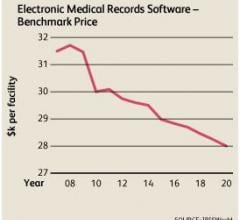
August 7, 2019 — Cerner has announced the development of the Cerner Learning Health Network to help clinicians more easily and efficiently gain health insights and guide care. Cerner aims to automate data collection from multiple sources, including the electronic health record (EHR), to rapidly give medical researchers access to important information that has the potential to transform patient care. Through combined technology and expertise, Cerner and the Duke Clinical Research Institute (DCRI) have joined together to pilot the Cerner Learning Health Network and innovate clinical research registries in the process.
The pilot project and study, named the Learning Registry by the DCRI, will use the Cerner Learning Health Network to evaluate the use and potential impact of proven therapies for chronic cardiovascular disease. Cerner and the DCRI aim to bring together data and intelligence to deliver clinicians insights on chronic cardiovascular disease, which if not treated properly can lead to heart disease and stroke. In the pilot project, the DCRI will use Cerner technology to analyze de-identified patient data from the University of Missouri Health Care and Ascension Seton, in partnership with Dell Medical School at The University of Texas at Austin, with the goal of finding the most effective treatment options.
After the pilot project and study are complete, the Cerner Learning Health Network is expected to have wide-reaching applications in life sciences, pharmaceuticals and healthcare at large. The automation and streamlining of health data for clinical research has the potential to speed innovation and life-saving insights. More research on populations’ health gives clinicians additional tools to identify and treat a myriad of diseases and health concerns.
Clients will be able to leverage HealtheDataLab with the Cerner Learning Health Network to aggregate de-identified patient data from both Cerner and non-Cerner EHRs. HealtheDataLab is a tool that leverages the capabilities of HealtheIntent, Cerner’s big data and insights platform for population health management. Researchers can use HealtheDataLab to take de-identified patient data, transform the data sets into research-ready formats, and build complex models and algorithms to give providers more information to make more informed care decisions. By using predictive modeling and intelligence, the platform supports early identification of individuals who may be at risk for costly episodes of care and can help pinpoint the most effective and cost-efficient treatment options.
“Current models for clinical research and registries that rely on mostly manual chart abstraction are too expensive, too slow and too small to continue. We have to figure out better ways to leverage existing electronic resources to transform how we do clinical research,” said Ann Marie Navar, M.D., Ph.D., principal investigator and cardiovascular prevention researcher, DCRI. “The EHR is an obvious starting point and HealtheIntent has all the right ingredients. It incorporates data from multiple EHRs, can link to national mortality and claims databases, and helps us to harness the power and information security of cloud computing.”
The DCRI plans to publish the research results from the pilot project in a study sponsored by Janssen Pharmaceuticals Inc., a pharmaceutical company of Johnson & Johnson, with several products used to treat and prevent cardiovascular disease.
For more information: www.cerner.com


 June 14, 2024
June 14, 2024 









